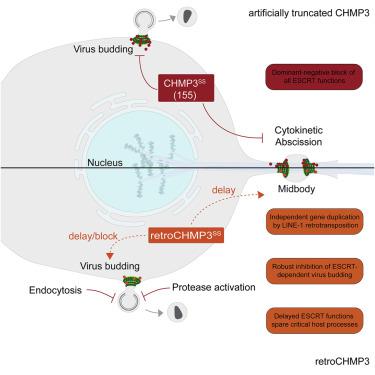Cell ( IF 45.5 ) Pub Date : 2021-09-30 , DOI: 10.1016/j.cell.2021.09.008 Lara Rheinemann 1 , Diane Miller Downhour 2 , Kate Bredbenner 3 , Gaelle Mercenne 1 , Kristen A Davenport 4 , Phuong Tieu Schmitt 5 , Christina R Necessary 2 , John McCullough 1 , Anthony P Schmitt 5 , Sanford M Simon 3 , Wesley I Sundquist 1 , Nels C Elde 2

|
Many enveloped viruses require the endosomal sorting complexes required for transport (ESCRT) pathway to exit infected cells. This highly conserved pathway mediates essential cellular membrane fission events, which restricts the acquisition of adaptive mutations to counteract viral co-option. Here, we describe duplicated and truncated copies of the ESCRT-III factor CHMP3 that block ESCRT-dependent virus budding and arose independently in New World monkeys and mice. When expressed in human cells, these retroCHMP3 proteins potently inhibit release of retroviruses, paramyxoviruses, and filoviruses. Remarkably, retroCHMP3 proteins have evolved to reduce interactions with other ESCRT-III factors and have little effect on cellular ESCRT processes, revealing routes for decoupling cellular ESCRT functions from viral exploitation. The repurposing of duplicated ESCRT-III proteins thus provides a mechanism to generate broad-spectrum viral budding inhibitors without blocking highly conserved essential cellular ESCRT functions.
中文翻译:

RetroCHMP3 阻断有包膜病毒的出芽而不阻断胞质分裂
许多包膜病毒需要运输(ESCRT)途径所需的内体分选复合物才能离开受感染的细胞。这种高度保守的途径介导重要的细胞膜裂变事件,这限制了适应性突变的获得以抵消病毒的共选择。在这里,我们描述了 ESCRT-III 因子 CHMP3 的重复和截短副本,它们阻止 ESCRT 依赖性病毒出芽,并在新世界猴和小鼠中独立出现。当在人类细胞中表达时,这些retroCHMP3蛋白可有效抑制逆转录病毒、副粘病毒和丝状病毒的释放。值得注意的是,retroCHMP3 蛋白已经进化到减少与其他 ESCRT-III 因子的相互作用,并且对细胞 ESCRT 过程几乎没有影响,揭示了将细胞 ESCRT 功能与病毒利用分离的途径。因此,重复的 ESCRT-III 蛋白的重新利用提供了一种产生广谱病毒出芽抑制剂的机制,而不阻断高度保守的基本细胞 ESCRT 功能。











































 京公网安备 11010802027423号
京公网安备 11010802027423号